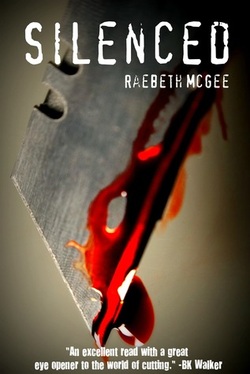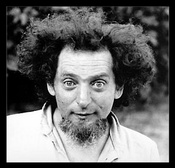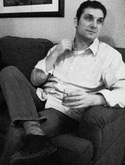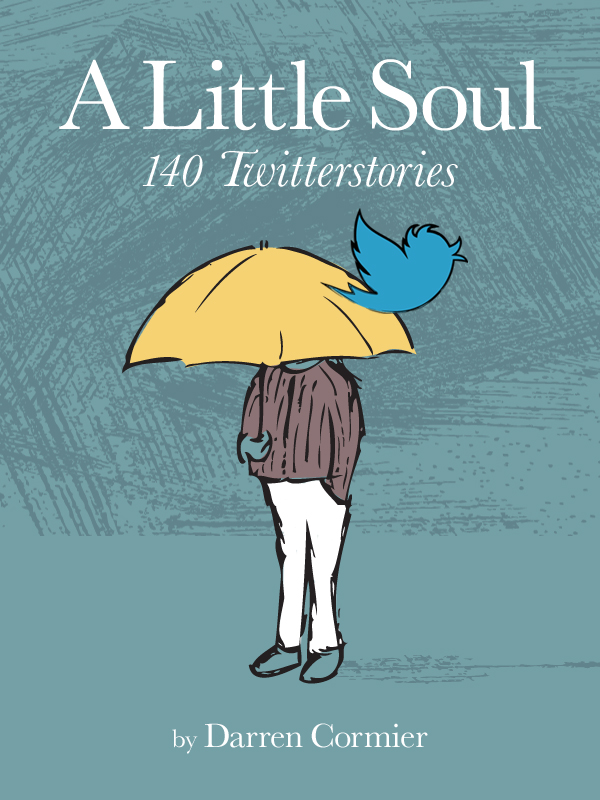
The book chronicles the teenage life of Amber Brown, outwardly a normal moody teenager struggling with acclimating to a new town in West Virginia, and trying to balance school, parental relationships, making new friends, and her new boyfriend Landon. To complicate matters, Amber discovers early in the book that the person she has known her whole life as her father, the very supportive Dave, is not her biological father, and that her mother and Dave have lied to her whole life. One of Amber's few solaces becomes the time she spends alone in her bathroom cutting, the releasing of blood and the self-inflicted wounds substituted for the lack of emotional connection she is able to make with others.
The excerpt below is from early in the novel, after Amber finds out that Dave is not her real father.
I stop talking and head out of her office. I trudge to my room crying. The pain's flowing generously right through my body. It's attacking my delicate heart trat tries so hard to be strong. That's where it fails. It hurts and once again the darkness is getting the best of me. I settle myself down, and notice I'm not in my room. I'm in the bathroom. It's hard to manage the pain. I swiftfly pull down my flannel, red checkered night pants and sit on the toilet. I turn to get the blade and see I already grabbed it from its cubby hole.
I drag the blade across my upper thigh. Blood rushes out and fills my hand. The warmth of it feels good, along with the sting, which is normal. All of a sudden everything goes blurry and I get lightheaded. I hurry up and recline myself on the toilet, the best that I can. This never happened to me before.
Sarah was a pro. She cut longer than I did. She taught me that the thigh has thicker skin, therefore you have to apply more pressure. I never tried, until now. Did I do it wrong? Did I hit a vein? I hope not. I bring myself back from nearly passing out by grabbing a cold washcloth . Three minutes pass before I check to see if I can stand up.
Q: Tell me about your novel “Silenced.” When did you originally start the story? How did it evolve? What was the original kernel or acorn that became the story?
I first started Silenced as a high school writing assignment and it was considered a short story. It evolved when my younger sister, Audra read it and suggested I added onto it. She’s not much of a reader, so when she told me this, I knew my story had to be special. The original idea came from my own experiences that I added on to as I did more research and interviewed more people for it. The main character is basically based off of several different people and her experiences within the book are actual events that has happened in real life to some of those people.
Q: Give me a brief bio of your life:
I started out writing poetry for myself as a way to express my feelings. Then I found the love of writing during my English class in high school. From there I put poetry to the side and began writing books. When I’m not focused on spending time with my family, I’m writing or blogging. I have a blog where I help promote other authors and their work. I’m a mother to one beautiful six year old little girl and I have another on the way. I’m married to the man of my dreams who supports every aspect of my writing.
Q: What would you say are your strengths as a writer?
I’m very organized. When I have something that needs done I get it done promptly. I don’t like to have it hanging around waiting to be completed. I’m the type of writer that will not hesitate to help another out. I think as a writer we (writers) should stick together. Especially self published.
Q: What are you working on now?
I’m in the process of finishing up the second part to Silenced which I’ve titled, “Silenced: The Overtaking.” I’m also working on a paranormal series which I am not going to talk much about seeing how it’s a long way from being published.
Q: What publications has your work appeared in?
At this time I have a poem I wrote that will be published into a book where several authors have come together to create it. I’ve had some of my poetry published on poetry.com.
Q: Who are your primary influences, or inspirations, as a writer?
My primary influence as a writer is life. There are so many things out there that can be wrote about and it’s hard to pick one to start with.
Q: How has your upbringing influenced your work, if at all?
As I was growing up, my mother pushed the books and reading more than television or games. We didn’t have cable, a computer, or gaming system. She felt (and still feels) that all of these, at times, tend to over take some people. There’s so much more to life then electronics. I believe if my mother didn’t do this, then I may not have found my love for books or writing. So a HUGE thanks goes out to her to helping me find one of my true loves within life.
Q: What inspires you the most (e.g. music, landscape/nature, written word, life, etc.)?
Inspiration comes from many things but as I said above... life is my primary influence. I do tend to get inspiration from other books or articles.
Q: What are you reading right now?
At this time I’m reading three different books when I have the time.
Bread of Fools , by Duncan McGonall
Burning Bridges , by Nadège Richards
The Hope Habit: How to confidently expect God's goodness in your life by Terry Law, Jim Gilbert
Q: What authors, when you read them, make you think, “I’m giving up writing because I will never be as good as them?”
I don’t believe there was an author to actually make me think this. There’s been a few to make me think that I want to be like them with my own writing. Thus giving me more drive to write better and get my work out there. I’d rather not name them because I don’t want anyone thinking I’m taking favoritism.
Q: Why do you write?
Here’s my own quote that I life by and that answers this question. “I don’t write to impress. I write to express!!”
Q: If you weren’t writing, what else would you be doing?
I’d be preparing blog posts for interviews, tours, or reviews for other authors on my blog. I’d be helping to share the work of other authors where I can. When I’m not doing that I’m cleaning my house or reading.
Q: Name your top five favorite books and/or top five favorite authors?
Oh this one is a hard one because there are so many great books/authors out there. Therefore, I can’t answer this one.
Q: What is your non-writing claim to fame?
This I am also unsure of because I’m not famous... therefore I don’t know.
And now we get into the non-writerly questions of the interview:
Q: What is your favorite beverage?
I love water but I also enjoy my coffee.
Q: What is your favorite curse word?
I don’t curse.
Q: Favorite food.
Cereal, Cocoa Wheat’s, and Pizza... I can’t choose just one here.
Q: What is your most vivid memory?
There’s so many. But the two that I won’t ever forget is the day I got married and the birth of my daughter.
Q: What is your favorite sound?
I love hearing rain and thunder.
Q: What is your least favorite sound?
Any high pitched noises. They agitate me.
Q: If heaven exists, what do you think God will say upon meeting you at the pearly gates? What would you want him to say?
For me... I believe heaven most certainly exists. I think God will be greeting me with open arms and say “Job well done.” I try to be the best Christian I can. As it’s known... there’s no perfect Christian but one can try to be. I would say, “Finally... I’ve been waiting my entire life for this.”

 RSS Feed
RSS Feed

